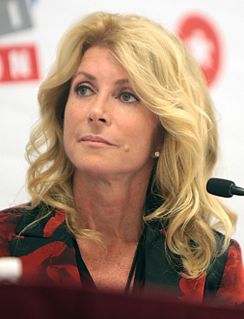A Quote by Dana Goldstein
This is something that Randi Weingarten said to me when I interviewed her once, which I think I quote in chapter nine. She talks about how only 7 percent of private sector workers in the American economy are in unions. So all the protections that teachers have that are due to collective bargaining - including generous pensions, generous health plans, limits to what they can be asked to do after school and in the summers - all of those things are sources of resentment to the public. And I think that politicians have played off of that quite effectively.
Quote Topics
About
After
After School
American
American Economy
Asked
Bargaining
Chapter
Collective
Collective Bargaining
Due
Economy
Effectively
Generous
Health
Health Plan
Her
How
Including
Limits
Me
Nine
Off
Once
Only
Pensions
Percent
Plans
Played
Politicians
Private
Private Sector
Public
Quite
Quote
Resentment
Said
School
Sector
She
Something
Sources
Summers
Talks
Teachers
Things
Think
Those
Unions
Which
Workers
Related Quotes
Private sector unionization is down to practically seven percent. Meanwhile the public sector unions have kind of sustained themselves [even] under attack, but in the last few years, there's been a sharp [increase in the] attack on public sector unions, which Barack Obama has participated in, in fact. When you freeze salaries of federal workers, that's equivalent to taxing public sector people.
The public sector can only feed off the private sector; it necessarily lives parasitically upon the private economy. But this means that the productive resources of society - far from satisfying the wants of consumers - are now directed, by compulsion, away from these wants and needs. The consumers are deliberately thwarted, and the resources of the economy diverted from them to those activities desire by the parasitic bureaucracy and politicians.
I was grateful that Facebook already had generous bereavement policies . Now Facebook employees receive 20 days paid leave to grieve the loss of an immediate family member and 10 days for an extended family member. I'm proud that we're able to do this and I hope more businesses do the same. Only 60 percent of private sector workers get paid time off after the death of a loved one, and then it's usually just a few days. Workers and families deserve better than that.
I once interviewed David Herbert Donald, the Lincoln historian, and we talked about how one deals with the secondary sources and the previous biographies. He said something which kept coming back to me as I worked on Cleopatra, which was: 'There's no further new material; there are only new questions.'
Just as members of American teachers unions often send their own children to private schools, so unionized workers at government-run hospitals in Britain have insurance that allows them to go to private hospitals. In both cases, those on the inside realize how bad these institutions are, regardless of what they say to those on the outside.
The teachers unions are the clearest example of a group that has lost its way. Whenever anyone dares to offer a new idea, the unions protest the loudest. Their attitude was memorably expressed by a longtime president of the American Federation of Teachers: He said, quote, 'When school children start paying union dues, that's when I'll start representing the interests of children.'
Lady Bird was very, very shy and yet she would go out and speak publicly on behalf of her husband and on issues that mattered to her. Someone asked her once how she did it, and she said you have to "get so wrapped up in something that you forget to be afraid." And I have found that that absolutely captures those moments when I fought for something I cared about. I get so caught up in fighting for things that are important to me that it pushes me through fear and doubt.
Collective bargaining has always been the bedrock of the American labor movement. I hope that you will continue to anchor your movement to this foundation. Free collective bargaining is good for the entire Nation. In my view, it is the only alternative to State regulation of wages and prices - a path which leads far down the grim road of totalitarianism. Those who would destroy or further limit the rights of organized labor - those who would cripple collective bargaining or prevent organization of the unorganized - do a disservice to the cause of democracy.
































